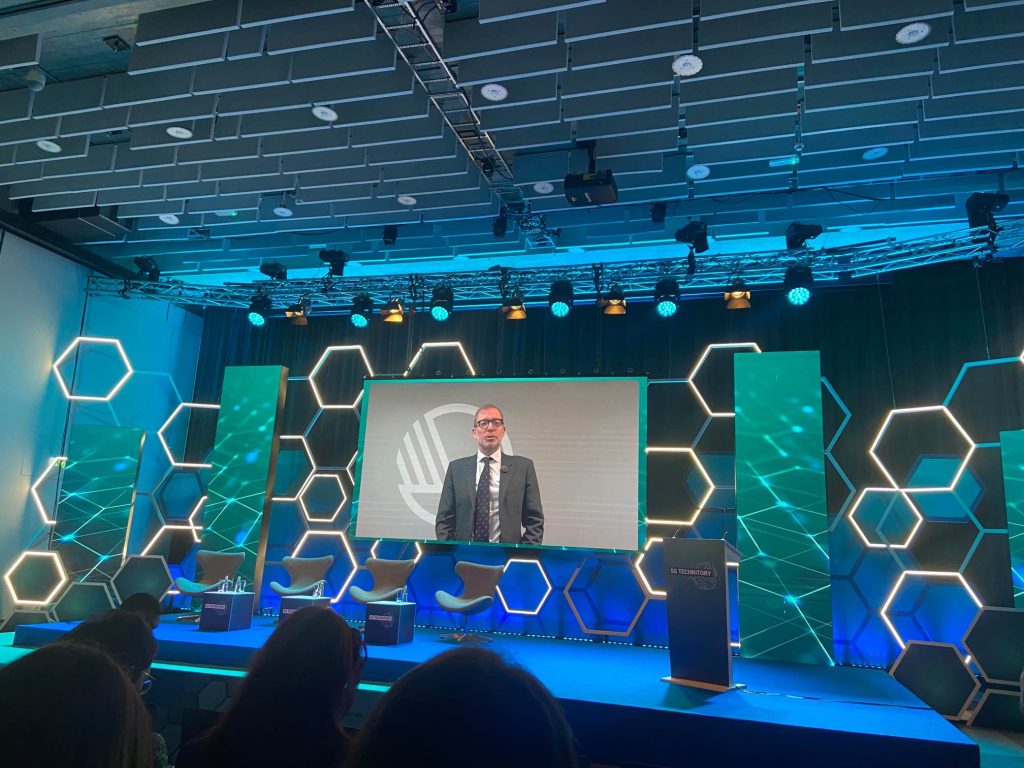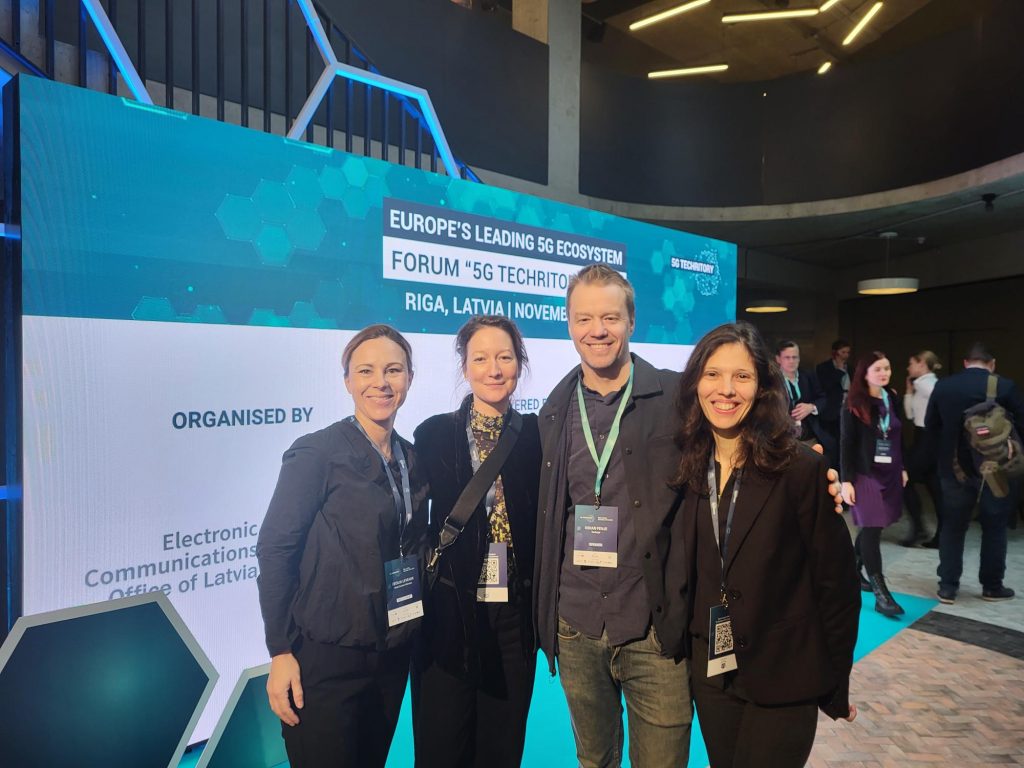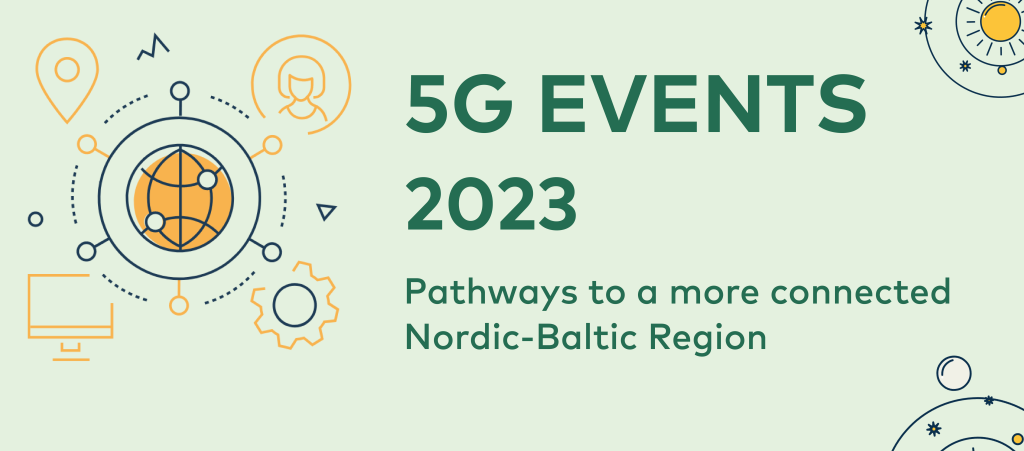As part of the 5G Techritory Forum in Riga on 29-30 November, the Nordic Council of Ministers for Digitalisation and Nordregio arranged a session dedicated to Nordic-Baltic collaboration on the 5G rollout. Nordregio researchers Ana de Jesus and Oskar Penje were there to present the 5G Nordic-Baltic Monitoring tool project and to gather the project reference group.
The 5G Techritory Forum gathered over 2000 participants online and physically to meet leaders and policymakers to discuss the 5G ecosystem trends and co-create the industry’s future. The session “5G applications in public services: What to envision for Nordic-Baltic cross-border collaboration” was hosted by Stefan Eriksson, head of the Nordic Council of Minister’s office in Riga. Project manager Oskar Penje talked about the 5G ecosystem and trends in the Nordic-Baltic countries.
This was followed by a panel discussion moderated by Dr. Heidi Himmanen (Chief Adviser, Finnish Transport and Communications Agency Traficom), including Annika Svensson (Project Manager, Luleå University of Technology), Markku Niemi (Business Tampere), and Elīna Lidere (Latvijas Mobilais Telefons).

Different perspectives were shared as Annika Svensson gave her views on 5G innovations in sparsely populated areas, Markku Niemi discussed 5G as a cornerstone for smart cities, and Elīna Lidere added to the debate on creating connected and data-driven cities using 5G technology. Some of the overarching questions addressed were:
- What can 5G offer to public services in the Nordic-Baltic countries?
- What are the benefits for society?
- What are the success factors in building partnerships and collaborations in 5G?
- What are the main barriers and limitations to further collaboration?
The session is available here. Also, don’t miss the interview with Annika Svensson and Heidi Himmanen.
There is a need to showcase more of what is being developed
5G has real benefits for society and solves real problems. It can empower more efficient and cost-effective services and support equality in access to healthcare and education, especially in sparkly populated areas. Its role goes from transit control and safety to the entertainment industry to inspire new solutions to old and unforeseen crises and shocks, as it was during the Covid-19 pandemic.
“But while 5G has the potential to improve national competitiveness and transform government operations, it is not an automatic transformation. It implies significant adjustments in different areas, from network infrastructure, systems, and application to data ethics and privacy and workforce implications. These challenges, associated with social inclusion, urban/rural differences, and sparsely populated areas, signal the importance of 5G for public services provision and the need to develop regional cooperation and synergies further.”, Ana de Jesus and Oskar Penje say.

Within Europe, the Nordic and Baltic countries stand out with different rhythms concerning the 5G rollout.
We can see strong political commitments and investments in developing the 5G ecosystem, and there is a shared vision of becoming the world’s most sustainable and integrated region by 2030. At the same time, the Ministerial Declaration Digital North 2.0 recognized that an efficient public sector empowered by digital services for citizens and businesses is essential to becoming the most integrated region in the world.
Ana de Jesus & Oskar Penje
Nevertheless, the still recent rollout and introduction of 5G in different countries point to a lag when unlocking the full promise of mobile technology. In this initial phase of 5G development, large, established service providers and operators appear to still dominate the provisioning of services in the Nordic-Baltic Countries, being fast in deploying and promoting 5G networks. Large groups seem to have regional interests, like Telia in Sweden, Telenor in Norway, TDC in Denmark, and LMT in Latvia.
In the Nordic-Baltic countries, transportation and mobility are the more advanced activities in the development of 5G. Nevertheless, it is worth noticing the relevance of service activities linked with smart cities, healthcare, education, welfare, and public administration in 5G development in the region.
Many successful projects, use cases, and trials are already taking place in the Nordic-Baltic region, and those still need to be reported more.
“Access to that information is difficult to get. There is a need to showcase more of what is being developed in a common platform to enable all this valuable knowledge to be shared and underline the different values of this new generation of mobile technology to competitiveness, environment, and society. That is one of the values of the 5G Monitoring tool and it shows its potential in knowledge sharing to boost 5G opportunities in the Nordic and Baltic regions.”
Nordregio will host matchmaking sessions in 2023 for actors within 5G
The 5G Nordic-Baltic Monitoring tool project is soon launching its first storymaps focusing on 5G for healthcare in the Nordic region, followed by another storymap at the beginning of 2023.
Also, at the beginning of the year, a beta version of the Nordic-Baltic 5G Monitoring Tool will be available for the 5G ecosystem actors to test.

During 2023 two analytical reports will be published. Nordregio will host a matchmaking webinar series of events for 5G actors. The aim is to inform key stakeholders about what is going on in the Nordic-Baltic 5G landscape and facilitate connections between actors to initiate or enhance regional cooperation. If you are interested in Nordic-Baltic collaboration, remember to preregister for our 2023 event series here.





